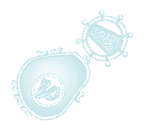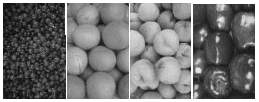En Español
In the United States or abroad? For business or
pleasure? When you travel, you risk coming into contact with germs you might not find at home.
Many of these germs can make you very sick.

|
Talk to your doctor about your travel plans before your
trip |

|
Take special care with food and water |

|
Protect your health (and the health of others) just as you
do at home |
|
|
For
people with special health needs, travel can be risky to their health. If you
have human immunodeficiency virus (HIV)-the virus that causes AIDS-you should
have all the facts. Travel, especially to developing countries, can increase
your risk of getting opportunistic infections. (They are called "opportunistic"
because a person may get the infection when their weakened immune system gives
it the opportunity to develop.) The best thing you can do when you travel is to
know the medical risks and to take steps to protect yourself
Before You
Travel
- Talk to your doctor or an expert in travel medicine about health risks in the area
you plan to visit. They can tell you how to keep yourself healthy when you travel to places where certain illnesses are a problem. They also can tell you about places that might not be safe for you to visit. Ask them if they know of doctors who treat people with HIV in the region you plan to visit.
Plan in advance for problems that might
come up.
 Traveler’s diarrhea is a common problem.
Carry a 3- to 7-day supply of medicine
(antibiotics) to treat it. A common drug
for traveler’s diarrhea is ciprofloxacin
(SIP-ro-flocks-uh-sin). If you are pregnant,
your doctor may suggest you take TMP-
SMX (trimethoprim-sulfamethoxazole [try-
METH-o-prim - sul-fa-meth-OX-uh-sole])
instead. Traveler’s diarrhea is a common problem.
Carry a 3- to 7-day supply of medicine
(antibiotics) to treat it. A common drug
for traveler’s diarrhea is ciprofloxacin
(SIP-ro-flocks-uh-sin). If you are pregnant,
your doctor may suggest you take TMP-
SMX (trimethoprim-sulfamethoxazole [try-
METH-o-prim - sul-fa-meth-OX-uh-sole])
instead. - Insect-borne diseases are also a major
problem in many areas. Take a good supply of an insect repellent that contains
30 percent or less "Deet" with you. Plan to sleep under a mosquito net, preferably one treated with permethrin, in
places where there is malaria or dengue [DEN-gay] fever. Unless you need to go
there, avoid areas where yellow fever is found.
- Ask your doctor if you need to take
medicine or get special vaccinations before you travel. He or she will know which
vaccines are safe for you. Your doctor will also know the best ways to protect
you from such things as malaria, typhoid fever, and hepatitis. Make sure all your
routine vaccinations are up to date. This is very important for HIV-infected children
who are traveling.
- If you are leaving the United States, make
sure you know if the countries you plan to visit have special health rules for visitors.
These rules can include vaccinations that may not be safe for HIV-infected people
to take. Your doctor or local health department can help you with this.
- If you have medical insurance, check to
see what it covers when you are away from home. Many insurance plans have
limited benefits outside the United States. Very few plans cover the cost of flying you
back to the United States if you become very sick. Make sure your paperwork is in
order, and take along proof of insurance when you travel.
When You Travel
Food and water in developing countries may not be as clean as they are at home. These
items might contain bacteria, viruses, or parasites that could make you sick.
-
 Do not eat raw fruit and vegetables that you do not peel yourself, raw or undercooked seafood or meat, unpasteurized dairy products, or anything from a street vendor. Also, do not drink tap water, drinks made with tap water, or with ice made from tap water, or unpasteurized milk. Do not eat raw fruit and vegetables that you do not peel yourself, raw or undercooked seafood or meat, unpasteurized dairy products, or anything from a street vendor. Also, do not drink tap water, drinks made with tap water, or with ice made from tap water, or unpasteurized milk.
- Food and drinks that are generally safe include steaming-hot foods, fruits that you peel yourself, bottled (especially carbonated) drinks, hot coffee or tea, beer, wine, and water that you bring to a rolling boil for1 full minute. If you can’t boil your water, you can filter and treat it with iodine or chlorine, but this will not work as well as boiling.

- Tuberculosis, or "TB," is very common worldwide, and can be severe in people
with HIV. Avoid hospitals and clinics where coughing TB patients are treated.
When back in the United States, have your doctor test you for TB.
- In many places, animals may roam more freely than they do in the area where you
live. If you think animals have left droppings on beaches or other areas, always
wear shoes and protective clothing and sit on a towel to avoid direct contact with the
sand or soil.

- Swimming can make you sick if you swallow water. You should
never swim in water that might contain even very small amounts of sewage or animal waste.
To make sure that you get the most fun from your trip, protect your health (and
the health of others) just as you do at home.
- Take all medications as prescribed by your doctor.
- If your doctor has you on a special diet, stick with it.
Take the same precautions that you take at home to prevent giving HIV to others.
The Centers for Disease Control and Prevention (CDC) offers international travel information on the Internet at
http://wwwn.cdc.gov/travel/ and by telephone at 888-232-3228. This number also provides an information "menu," including how to receive specific travel advice by fax.
For
More Information:
Free referrals and information:
CDC-INFO
1-800-CDC-INFO (232-4636)
TTY: 1-888-232-6348
In English, en Español
8A-8P (EST) M-F. Closed weekends and major federal holidays.
Free materials:
Order single copies of this and other HIV/AIDS documents.
Free HIV/AIDS treatment information:
AIDSinfo
(800) 448-0440
Project Inform
(800) 822-7422
Links:
Drugs undergoing clinical trials:
AIDSinfo
(800) 448-0440
Social Security benefits:
Social Security Administration
(800) 772-1213
(You also may request a personal earnings and
benefit estimate statement to help you estimate the
retirement, disability, and survivor benefits payable
on your Social Security record.)
Child Health Insurance Program
1-877 KIDS NOW (1-877-543-7669)
CDC Division of HIV/AIDS Prevention Internet
address: http://www.cdc.gov/hiv/
Additional brochures in the Opportunistic Infections
Series:
*Use of trade names does not imply endorsement by the
United States Department of Health and Human Services.
|